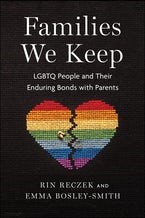Relationships with parents are immensely central to children’s life experiences. Parents are understood as the de facto caregivers to children and young adults, and the quality of relationships with parents shape children’s entire life trajectories. Norms around parenting emphasize that parents should feed, clothe, and love their children. However, parents can also be sources of strain, rejection, fear, and trauma. What is remarkable is that even the most problematic parent-adult child relationships are expected to be—and often are—maintained. The new book Families We Keep: LGBTQ People and Their Enduring Bonds with Parents, explores why and how the parent-adult child bond remains intact – even when it maybe shouldn’t.
Families We Keep centers the voices of 76 LGBTQ adults and 44 of their parents who volunteered to be interviewed (separately) about their parent-child relationships. On average, LGBTQ people have more strained relationships with parents than cisgender heterosexual adult children due to parents’ homophobia, biphobia, transphobia, and the other gender and sexuality related stigmas. In fact, many LGBTQ adults’ ties with their parents are so bad that LGBTQ people create “chosen” families to supplement the support and love missing in family of origin ties. Still, even when LGBTQ adults form chosen families, many also keep their ties with parents. This is what Families We Keep calls a culture of Compulsory Kinship: the assumption and social expectation that family of origin relationships—especially ties with parents—are natural, inevitable, and the most central. Families We Keep adds new insight to why and how this is the case.
LGBTQ adults use three rationales for why they keep ties with parents in line with compulsory kinship. First, LGBTQ adults and their parents draw on what are contemporary ideals of family as spaces of unconditional love and closeness – even when faced with unloving or unclose behavior. Second, LGBTQ people draw on notions of growth – of “it’s getting better” – to explain why they stay in these ties, even when the current state of the relationship is still bad. And third, LGBTQ adults draw of parents as unique (i.e., you only get one mom), and therefore this tie must be kept, even if it hurts. In showing these collective reasonings, Families We Keep highlights how the social forces of compulsory kinship frame parent-adult child relationships as natural, inevitable, and enduring regardless of the quality. Notably, the ways in which compulsory kinship operates is deeply racialized, with historic and ongoing structural racism subjecting individuals to different levels of stigma and discrimination, and increasing importance of family ties.
In answering the question of how do LGBTQ adults keep ties with parents, the second part of the book shows the type of work—specifically “conflict work”–that is used to keep these relationships intact. For LGBTQ adults, this work revolved around managing, minimizing, or coping with parental homophobia or transphobia, including avoiding or minimizing discussion of their LGBTQ identity or educating their parents about their LGBTQ identity, to name just a few strategies. The work to keep these bonds close fell heavily on the shoulders of LGBTQ adults, creating even more stress in an already strained family circumstance.
Overall, Families We Keep is a book about the importance of compulsory kinship in sustaining what is considered family, structuring choices about who we should be in family ties with even if family bonds are harmful or strained. This book is critical in showing the social forces that bond the tie between parents and their adult children, and should be considered in concert with a large and important scholarship on children who are forcibly removed from their parents—in particular in communities of color. In fact, in contrast to the parents of LGBTQ adult children found in this book, many have fought and are currently fighting for their rights to keep their own children including Indigenous peoples who had their children removed from their homes and placed in often deadly residential schools, Black parents’ experiences due to an unjust child welfare system and disproportionate incarceration, and immigrant parents who can be legally separated from their children. While many children are forcibly removed from parents, other children and adults are in vulnerable positions by an unsafe but compulsory parent-child tie. These two trends—one of the State removing children from people of color and one of compulsory kinship keeping parents and adult children together despite abuse—can be viewed together as a broader system that works to control the family lives of adults. As such, Families We Keep ends with a call for wider social supports for all adults, especially those most vulnerable to economic insecurity ultimately with the goal to facilitate the opportunity for all people to choose the relationships and life that is most fulfilling to them.
Rin Reczek (@RinReczek) and Emma Bosley-Smith (@bosley_smith) are coauthors of the book Families We Keep: LGBTQ People and Their Enduring Bonds with Parents and other relevant articles published in Journal of Marriage and Family and Social Problems. Rin Reczek is a Professor of Sociology at Ohio State who has published over 60 articles and book chapters on the topics of marriage, parent-child ties, parenthood, gender, sexuality, and health.
Emma Bosley-Smith is an Assistant Professor at Alma College in the Department of Sociology. She got her PhD from Ohio State University, and is a qualitative researcher focused on sexualities, gender, and class.


Comments